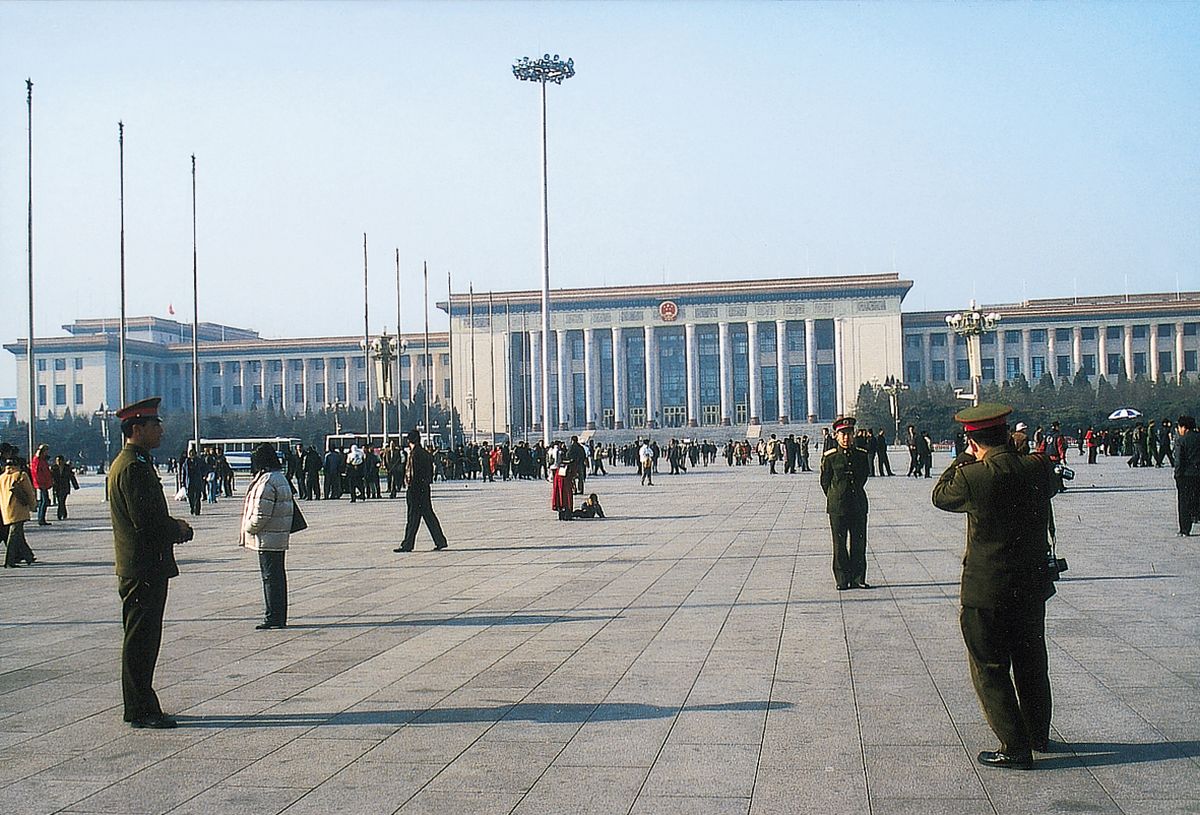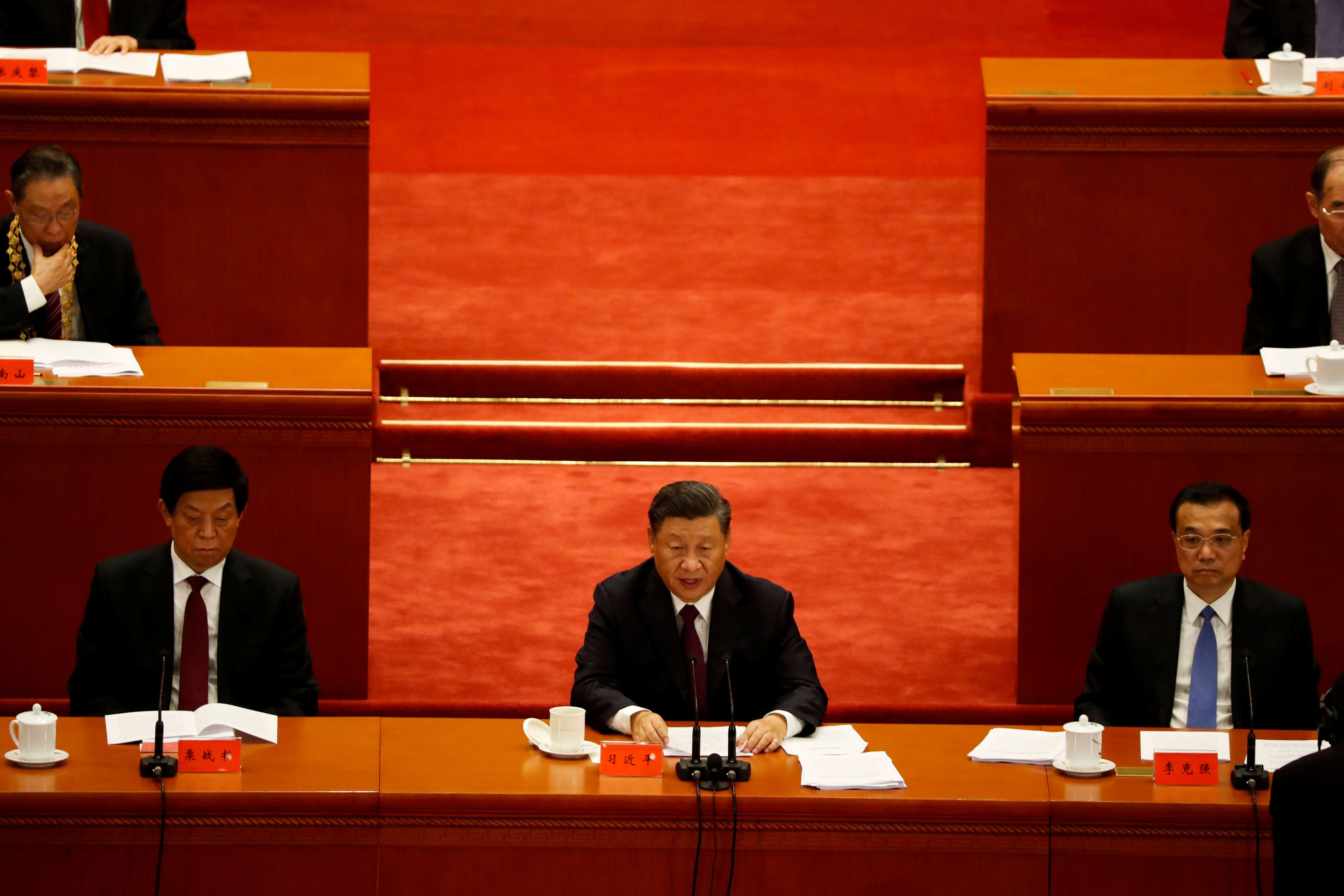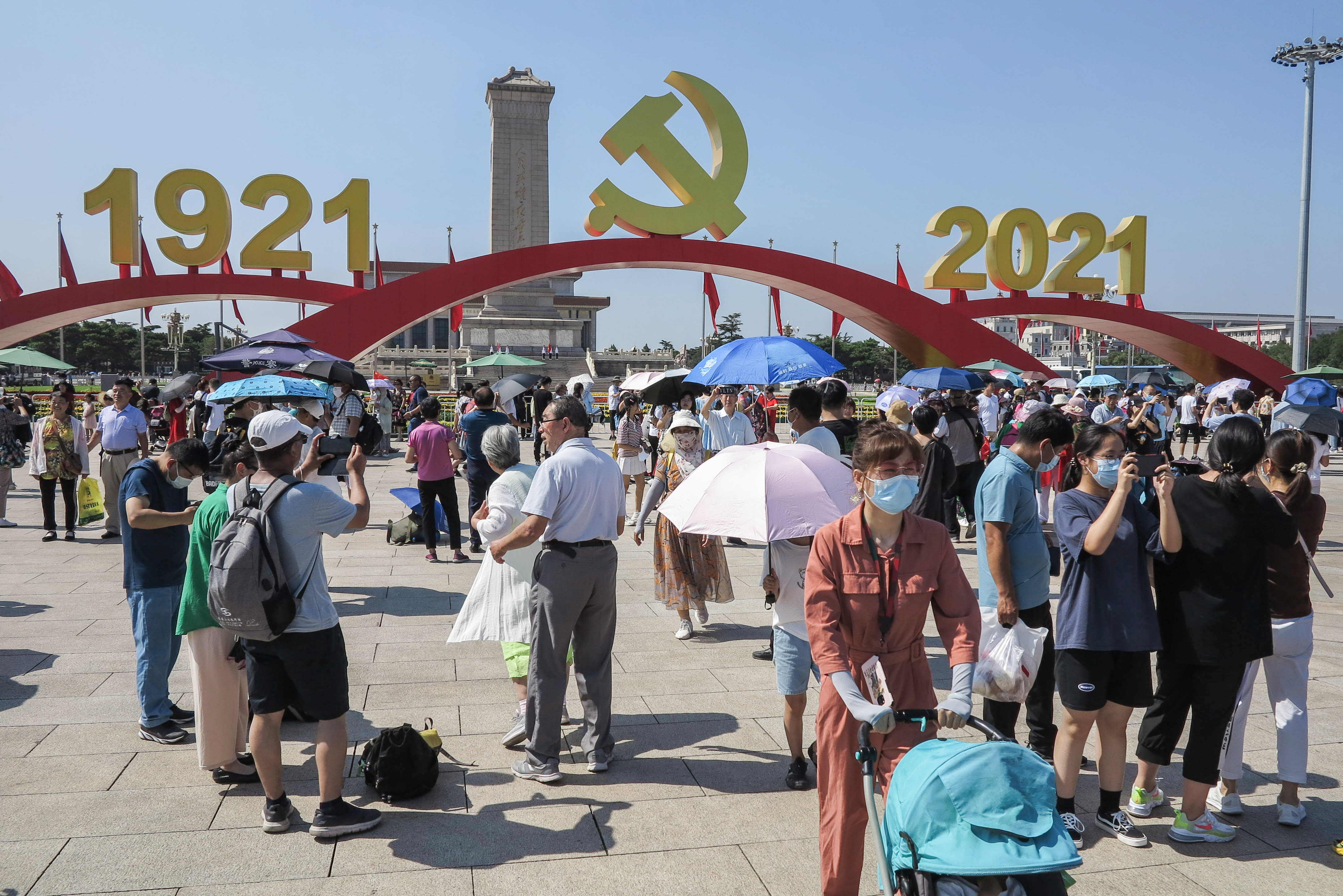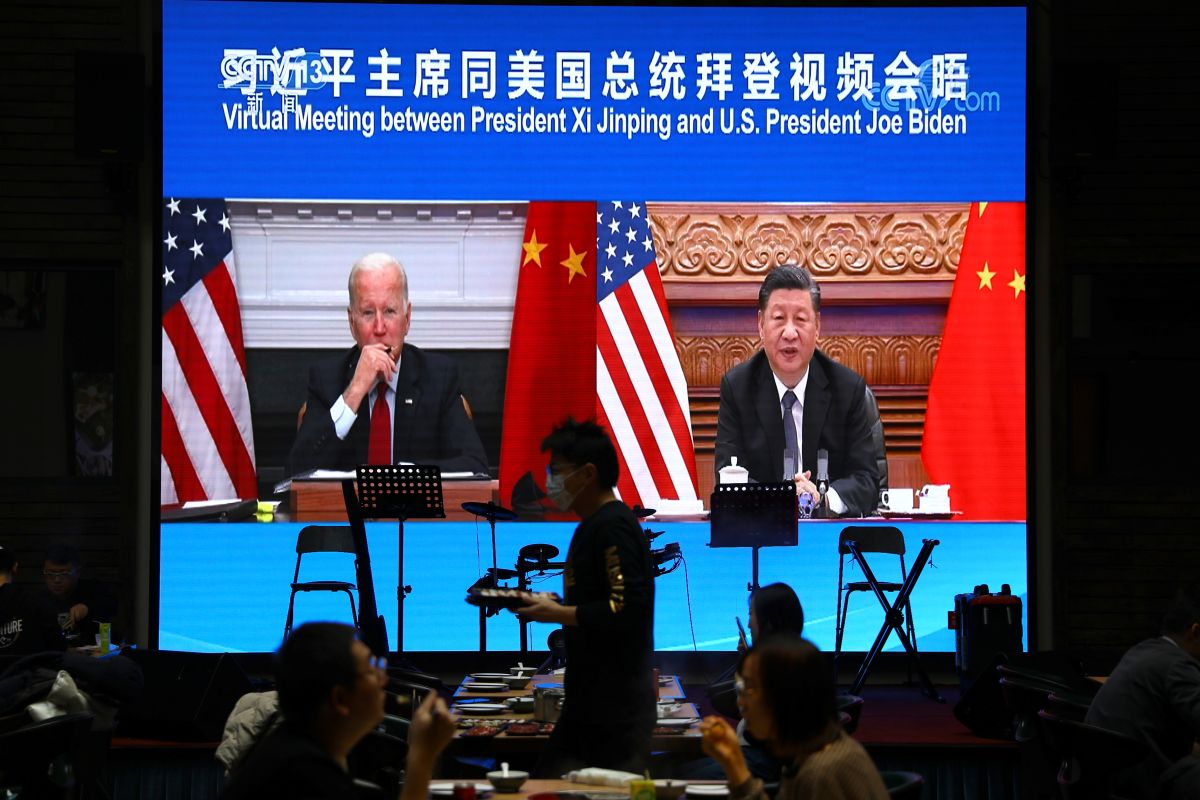Ahead of the CCP's 20th Congress, Changes in Personnel and Xi's Historical Role
The Chinese Communist Party (CCP) is preparing for its congress in the fall of 2022 when Xi Jinping is to be re-elected secretary-general and his proteges become members of the most important bodies of the CCP. To prepare for this, the party is carrying out personnel changes in the provinces and party apparatus, strengthening Xi’s image as guarantor of China’s development, and maintaining confrontational rhetoric in its foreign policy, especially on Taiwan and human rights.
 fot. A.Olej/FORUM
fot. A.Olej/FORUM
The CCP congress takes place every five years (usually in autumn) and is when it approves key decisions, including the election of the secretary-general and members of the Central Committee (CC). From among the members of the Central Committee, the Political Bureau (PB) is elected, and from it the Standing Committee (SC), a group of the most important politicians of the CCP. In March of the following year, the Chinese parliament changes state institutions in line with the party decisions. In 2018, the parliament that elected the chairman of China lifted the constitutional limit of two five-year terms for this position. Usually, the secretary-general of the party becomes the chairman. Therefore, at the congress in 2022, Xi may be re-elected as head of the CCP.
In November this year, elections of delegates for the congress began in the provinces, and the CC issued special recommendations in which it indicated loyalty to Xi as one of the criteria for evaluation. Meetings of the PB and the CC were held, focused on the history of the CCP and the importance of Xi in China’s development, as well as China’s economic policies. Promotion of supporters and resignations by Xi’s opponents are underway, as is a party propaganda offensive both inside and outside the country.
Personnel Changes
Xi’s control over the party, although extensive, is not absolute and requires the support and inclusion in power of other circles, including party members gathered around Prime Minister Li Keqiang. According to the current leadership of the CCP, the success of the congress would be the selection of an SC that will support the continuation of Xi’s policy, including increasing the party’s power over state institutions and changing the economy to the so-called “double circulation” model. Significant changes on the SC are possible—of the current seven members, two to six may retire (the formal age limit of 68 years has been reached by three, including Xi). Part of this process has been the nomination of new provincial secretaries who either automatically belong to the PB (Shanghai, Tianjin, Guangzhou) or can be elected to it. In October, party leaders in four provinces (Heilongjiang, Jiangsu, Jiangxi, Hunan) and one region (Tibet) were named. Although the changes resulted from the retirement of their predecessors, the newly appointed secretaries are Xi affiliates from various stages of his career. In turn, with the perspective of China’s development period until 2049, it is highly probable that a politician will be selected for the SC who could succeed Xi in 2027. Currently, Cheng Min’er (head of the CCP in Chongqing), Cai Qi (party secretary in Beijing), Liu He (PB member and deputy prime minister for economic affairs), or Chen Xi (head of the Organisational Department at the Central Committee of the CCP and a PB member) have a good chance to do so.
Part of the preparations for the congress includes disciplining the party apparatus, this time mainly people in institutions responsible for security and justice. This year as part of the anti-corruption campaign, party discipline authorities initiated proceedings against tens of thousands of people, including many police officers. In October, the party launched an investigation against Fu Zhenghua, a former justice minister, on charges of violating party discipline. In September, Sun Lijun, a former deputy minister of public security, was removed from the CCP on corruption charges. Both decisions were personally approved by Xi.
“History” in Service of the CCP
In addition to the personnel changes, an important element of preparations for the CCP congress is raising Xi’s image and that of the party itself. This is important in the context of the COVID-19 pandemic, as well as socio-economic problems. In addition to recognising Xi’s achievements (e.g., increasing the prosperity of the Chinese), state propaganda emphasises the beneficial influence of his rule on China’s development. This includes a resolution revising official Chinese history adopted in November this year by the sixth plenum of the Central Committee of the CCP. For the third time (previously in 1945 and 1981), the party has presented its own interpretation of history. This time, in addition to strengthening the cult of personality of Xi, it criticised the interference of the West in China’s internal affairs, including the protests of June 1989. The resolution also argues that a condition for China’s economic development and international position is that Xi remains at the helm of power. It emphasises that, thanks to his efforts, by the 100th anniversary of the founding of the CCP in June, China had succeeded in eliminating poverty, and Xi’s next tenure will allow China to achieve the status of a developed country in 2049.
The International Context
The personnel changes and ideological pressure are accompanied by limitations on visas for foreigners and strict quarantine conditions, which de facto reduce China’s contact with the world. The movement of people is minimal and the possibilities of foreign journalists’ activities are very difficult. The authorities justify this by their “zero case” policy against the COVID-19 pandemic, which is intended to maintain the efficiency of the health service, and thus social stability. This is important due to reports of the low effectiveness of Chinese vaccines, also by the new Omicron variant.
The smaller number of foreigners, as well as the use of digital surveillance systems, allow the CCP to isolate the society more intensively, and thus strengthen the message about China’s systemic superiority over the West. In such an atmosphere, the Olympic Games in Beijing in February 2022 will also take place and will be used to demonstrate China’s organisational efficiency, especially in the face of socio-economic challenges and tensions in the international arena. The effect has been undermined by the announced diplomatic boycott by seven countries so far, including the U.S. and the UK. Party media has deprecated these declarations by claiming that the arrival of politicians would only increase the pandemic threat. The authorities are also censoring news about the boycott and elevating other, more positive information, for example, the UN’s secretary-general’s announcement of his intention to come to the Games. To improve its image before the Olympics, China has softened its international messaging by signalling that the rivalry with the U.S. has calmed, citing, for example, the last Xi-Biden talks and even the possibility that sanctions against the EU would be lifted if the Union reciprocates. The Chinese remain intransigent on issues of key importance to its interests, in particular the status of Taiwan and human rights. For example, the former head of the Xinjiang security apparatus, sanctioned by the U.S. and the EU, became the CCP secretary in Tibet. Hence, China is also imposing further restrictions on Lithuania related to its policy change.
Conclusions
It is crucial for the leadership of the CCP to efficiently implement changes in the party at the turn of 2022/2023. The main goal is to keep Xi in power, probably as the secretary-general and China’s chairman, and to nominate officials who support him to CCP bodies, which is very likely. Through these moves, Xi could continue to integrate the party apparatus and strengthen control over society, the economy, and state institutions. The promotions of officials, as well as the strengthening of the anti-corruption campaign, indicate, however, that the arrangements in the CCP regarding the future composition of the SC and PB are not yet complete. It is possible that a group at a higher level will be exposed as corrupt even just before the congress, which would give the CCP authorities an excuse for another purge and an argument in internal party negotiations.
The socio-economic challenges faced by China mean that the party is looking for legitimacy mainly in foreign policy, but there is no way that it can significantly alleviate it. Therefore, China’s rhetoric will remain aggressive, and limited retaliatory acts, including economic, are possible in relation to specific countries, such as those supporting Taiwan. At the same time, it is unlikely that this aggressive policy will turn to military action, for example, against Taiwan, in the coming months as it would severely undermine the propaganda around the Olympic Games.
The EU cannot count on conciliatory policy from China, such as lifting sanctions, before the planned EU-China summit. The EU also must take into account the escalation of Chinese retaliation against Lithuania, which includes violating the rules of international trade by threats to limit operations on the Chinese market for international companies cooperating with Lithuanian entities. In this context, it is in the EU’s interest not to yield to the Chinese appeals for the resumption of the ratification of the Comprehensive Agreement on Investment (CAI). The Union also could intensify economic contacts with Taiwan, which may contribute to strengthening transatlantic cooperation. In this context, it would be important for Poland to support the EU initiatives, including the adoption and implementation of the instrument for counteracting coercive measures (ACI). The possible participation of Member State representatives in the Beijing Olympics will be claimed by China as support for the CCP and confirmation of the lack of coherent EU policy towards the country.





